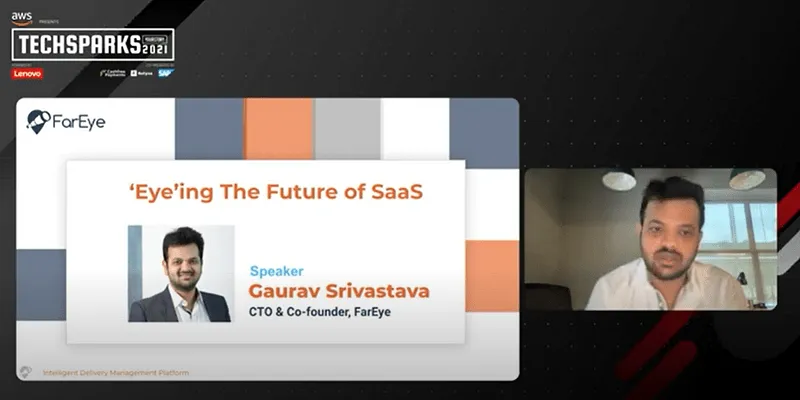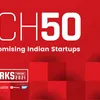Why automation is the next big thing in supply chain and logisticstech
SaaS has grown into a global business, and Indian SaaS companies have simultaneously grown as mainstream players. At TechSparks 2021 Gaurav Srivastava, Chief Technology Officer & Co-founder, FarEye spoke about how SaaS has become a global opportunity.
India is said to be on the cusp of unlocking a $1 trillion opportunity in the Software-as-a-Service (SaaS) story, creating nearly half a million new jobs by 2030, according to a report titled 'Shaping India’s SaaS Landscape' by SaaSBOOMi, Asia’s largest community of SaaS founders and product builders, in association with McKinsey.
Speaking on the theme of TechSparks 2021 — ‘What’s next: Rethinking the future’, Gaurav Srivastava, Chief Technology Officer & Co-founder of logistics SaaS startup , said that the SaaS ecosystem around the world is changing very rapidly, and India is right in the centre of it. The COVID-19 pandemic has accelerated the ecosystem even more.
Gaurav pointed out that while we saw a bumper IPO of SaaS major Freshworks, which is a flagbearer of the SaaS ecosystem, during 2021 we also saw fresh SaaS unicorns like BrowserStack, Mindtickle, Zoho, Postman, and Chargebee–to name a few. According to Gaurav, over 600 investors have put in more than $40 billion in the SaaS industry in the last year, which in his opinion is a strong statement showing how rapidly this industry is changing and growing.
India - the SaaS hub
Today, 55-60 percent of global IT and operations workflows are delivered from India. Gaurav said India is a key driver of the SaaS industry owing to the benefits like a huge pool of developers and software engineers. He added that it’s not just the enterprise, but India is also a large testing market because of a huge consumer base.
“It's not just the supply and demand but also the overall ecosystem that we have with the support from the government. India is already the third-largest startup base with a lot of accelerator programs and associations, and tech is a huge part. And all these factors make India capable of becoming the birthplace of the next generation of SaaS companies,” said Gaurav.

Quoting various reports, Gaurav is confident that India has an exciting opportunity to be on the world stage as a SaaS force to be reckoned with. According to market reports, if Indian SaaS providers can execute to their full potential, they could potentially generate annual revenues of $50-$70 billion by 2030, and win 4-6 percent of the global SaaS market. This represents a value-creation opportunity of up to $1 trillion.
SaaS, logistics, and automation
While all industries have opportunities to leverage and accelerate SaaS, Gaurav touched upon logistics, where Fareye has expertise.
He spoke about how traditional logistics companies have been struggling to keep up with the customers’ expectations of getting everything including cars delivered to their doorstep. FarEye enables enterprises to deliver at reduced cost with a superior customer experience.
FarEye's low-code approach provides an environment to develop applications with a quick turn-around time and minimal code to shorten the “concept to ship” cycle.
FarEye provides one of the strongest networks of full truckload (FTL) carriers in Asia, fast growing in US and Europe, Middle East, and Africa (EMEA) and is currently integrated with 2 million-plus networks of vehicles through telematics integrations with original equipment manufacturer (OEM) fitted devices. The platform enables businesses to accelerate process change and transform their end-to-end delivery journey.
Some of the key trends that are disrupting the supply chain and the logistics space include artificial intelligence / machine learning (AI/ML), autonomous driving vehicles and drones. Gaurav said that the Internet of Things (IoT) will continue to play a very crucial role.
He spoke about how COVID-19 is a great example of this trend, where vaccines were distributed via complex supply chains, some of which were covered by the IoT devices. “And we are just starting to scratch the surface here,” he said. He added that sensors are a huge opportunity lying ahead of us, which will open up many more capabilities in the logistics and supply chain.
Gaurav also asserted that any company in the supply chain and logistics space which will not adapt to change and tech disruption fast will struggle to survive. “Innovations are happening every day. There are new technologies being launched for logistics and supply chains. So the companies still need a platform or a solution which can evolve and take them to the next step,” he said.
Gaurav also added that digitisation and automation are going to play a key role in the logistics and supply chain space. “If there is a company which is still running on paper documents, manual processes, they don't stand a chance,” he opined. Gaurav concluded that automation is the top item that every CIO in the postal parcel global world is worried about right now. “So automation would be the next big thing that would be critical for the SaaS industry and the supply chain industry.”
To log in to our virtual events platform and experience TechSparks 2021 with thousands of other startup-tech enthusiasts from around the world, join here. Don't forget to tag #TechSparks2021 when you share your experience, learnings and favourite moments from TechSparks 2021.
For a line-up of all the action-packed sessions at YourStory's flagship startup-tech conference, check out TechSparks 2021 website.

Edited by Rajiv Bhuva




